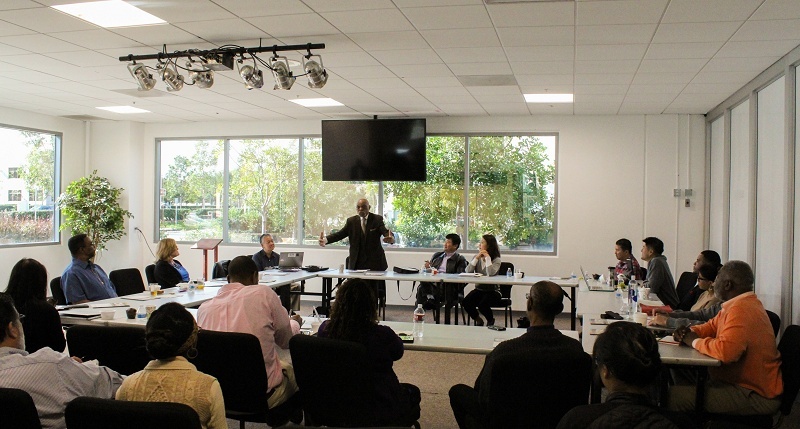
The incidents in the latter part of 2014 involving Michael Brown, Eric Garner, and Ezell Ford, and the public's reactions to the incidents, have brought to light the underlying racial tensions and unease that had been hiding underneath the surface in American society. In terms of legislation, ethnic minorities have won many victories in the last several decades, but it seems that the obstacles of biases, prejudices, or stereotypes across all races have yet to be completely conquered.
In an effort to take steps forward in actively building deeper relationships of understanding between different ethnic communities, a group of Christian leaders from various backgrounds gathered at "Together We Can Breathe," a follow-up symposium to the Institute of the Study of Asian American Christianity (ISAAC)'s sixth symposium which took place last November. During the recent Jan. 31 symposium, attendees were able to listen to one another's stories and discuss how members of the church can move forward towards unity, inclusion, and engagement with one another, regardless of race or background.

Attendees of the symposium also gathered in focus groups and discussed their personal stories and thoughts regarding race relations and engagement over lunch.
The one-day symposium was attended by people of various ethnic backgrounds and featured a brief, 15-minute presentation by Kay Higuera Smith, chair of the Department of Biblical Studies and professor of biblical studies at Azusa Pacific University, and was followed by an hour-long panel with Tommy Dyo, Cecil "Chip" Murray, James Yu, and Hyepin Im. Attendees also had the opportunity to discuss more personal stories and perspectives with one another in focus groups over lunch.
The crux of Smith's presentation was aimed on answering the question, "How do you engage someone who is socially, culturally 'other' than yourself?"
"There are two voices in Scripture that address this issue: the voice of estrangement and engagement," began Smith. "And I believe we have a very good reason to privilege the voice of engagement over the voice of estrangement."

Kay Higuera Smith spoke at "Together We Can Breathe" on what the Scripture shows regarding engagement between different social groups.
One of the examples that Smith gave in support of the voice of engagement was the story of the Syrophoenician woman in Mark 7. She asks Jesus to drive out the demon in her daughter, to which Jesus, according to Smith, responded with a voice of estrangement by saying, "First let the children eat all they want "¦ for it is not right to take the children's bread and toss it to their dogs" (Mark 7:27).
Smith said that the woman responds to this with humility and engagement: "Yes, Lord "¦ but even the dogs under the table eat the children's crumbs" (Mark 7:28). Such a response compelled Jesus to heal her daughter, and he told her, "For such a reply, you may go; the demon has left your daughter" (verse 29).
"She makes a compelling argument to Jesus, showing that estrangement is inferior to engagement," Smith explained.
She encouraged Christians to live out the voice of engagement by showing hospitality and embracing those who are different, and putting into action a passion for justice and righteousness.
Panel speakers responded to Smith's presentation, and shared their own stories and insights regarding race relations.
"We all have the ruach, the breath of God," said Rev. Dr. Cecil Murray, the former lead pastor of First African Methodist Episcopal (FAME) Church, and the chair of USC Cecil Murray Center for Community Engagement. "That means we all come from the same source. That means we are a family."
"We're all family, but we are going to have family feuds," Murray continued. "We cannot assume that because we are a family, we are going to be together. No"”the challenge of a family is to find a way, to make a way to be together. With our biological family, we love them because of, and there are also members of our biological family that we have to love in spite of. It's a work in progress."

The Institute of Asian American Christianity (ISAAC) hosted "Together We Can Breathe," a symposium in which Christians of various ethnicities gathered to discuss how Christians can engage more deeply with others from different backgrounds.
Many of those in the panel suggested certain steps Christians can take toward deeper engagement reconciliation among ethnic groups.
"The voice of engagement starts with the heart of engagement," said James Yu, chairperson of the board of directors of ISAAC. Yu shared the journey of his church, one that once only had Chinese members. However, as he and the church together began to pray for the surrounding community, the church found itself slowly transforming into the multi-ethnic church that it is today.
Hyepin Im, the president and CEO of Korean Churches for Community Development (KCCD), shared that in her own experiences, the first step to engaging with different communities was curiosity. She recalled the first time she saw an African American gospel choir perform in her middle school years, and the way that it sparked her curiosity about the African American church. This curiosity has stayed with her and led her to engage and work with FAME Church, which in turn led her to engage with various different people in different fields of work and from different backgrounds.
"My curiosity that has allowed me to go from estrangement to engagement, has allowed me to be in rooms that I never imagined," Im said. Im has been invited to sit in various rooms alongside influential figures throughout her career, including the White House.
Tommy Dyo, the national director for Cru's Epic Movement, shared the history of his own family and of the U.S. 442nd Infantry Regiment, which consisted mostly of Japanese Americans, that was dispatched to Europe to rescue another U.S. infantry regiment that was cut off by the Germans. The 442nd's involvement in Europe cost the solders over 800 casualties. Dyo emphasized that the Japanese Americans had chosen to fight for the U.S. despite the history of Japanese internment camps, one of the portions in history in which estrangement could not be any more evident.
"The Japanese soldiers in World War II knew that their sacrifice would lead to freedom," Dyo said. "Isn't that the heart of the gospel?"
"Together We Can Breathe" took place at Christ Our Redeemer (COR) African Methodist Episcopal Church in Irvine, CA. ISAAC is planning on having two more symposia as a "together" series, including one on March 28, called "Together We Can Revive," and another one thereafter called, "Together We Can Thrive."
For more information, visit www.isaacweb.org.


















